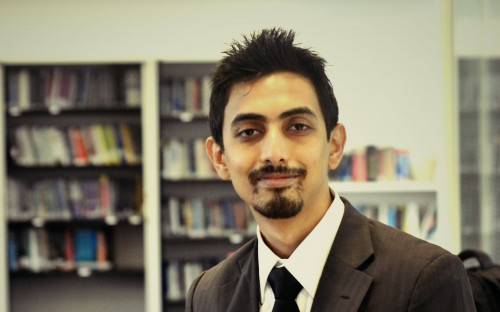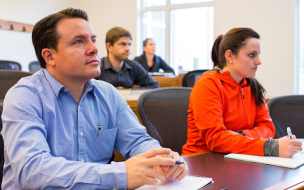He feels that he can benefit from Lancaster’s close proximity to London, but also the town’s links with other big UK cities such as Leeds and Manchester, and Edinburgh, Scotland’s capital.
When he graduates he wants to enter the software industry as a technical consultant – an area that is seeing massive growth in both service demand and recruitment.
Why did you decide to begin an MBA program?
I have been working in the software industry for the past six years in different roles. My goal has always been to move into the business side from the technical side.
In today's world of cut-throat competition, you need something to stand out in a crowd. The MBA program is that stepping stone which will enable me to progress further in my career.
You've worked in India. Why was the UK an attractive study destination?
I had offers from eight different colleges across the world to study an MBA, but the UK was always my first preference.
I had previously worked in the UK for a year with B&Q [a retailer] as a technical consultant. During that time I learnt a lot about how business is conducted in the UK. Familiarity with the UK business model was a driving factor.
Secondly, the UK universities are renowned worldwide for the top notch education that they provide. Finally, the fact that the UK MBA programs are of one year [in] duration was another important factor.
What made LUMS stand out as a business school?
The practical structure of the program. The MBA program at LUMS is more hands-on than theoretical, and my past experience tells me the best way to learn is when you are out there in the field.
The London connect was another huge attraction for this program. Finally, I have friends who had studied at LUMS previously and [they] are extremely successful. They gave me glowing feedback about the staff, the campus – the entire experience.
Are you able to benefit from the school's close links to London, but also other destinations in the UK?
The fact that from this year onwards the connection with London increases was a prime attraction. Getting the chance to do a corporate challenge consultancy project for the last three months in London, the financial capital of [the] UK, will definitely be an invaluable experience.
We are undergoing several company visits in London to help us understand how top notch businesses work in the UK. We will also be travelling to Edinburgh next year to take part in a careers fair. Being located close to Leeds and Manchester, Lancaster is ideally positioned to take advantage of the different opportunities that might arise.
You were awarded the MBA High Potential Scholarship. How much in funding did you receive, and how helpful was this funding?
I received a 50% scholarship. The scholarship was indeed helpful as it ensured that I did not need to apply for a bank loan. However, the greatest benefit of this scholarship was that it gave me a lot of confidence, as the High Potential Scholarship was awarded only to a handful of people, after several intense rounds of interviews.
What has the MBA experience been like so far?
The MBA experience thus far has been life changing. It has taught me the importance of time management and self-management.
It has been an eye opener to meet and study with people from all across the globe and learn their ways of working.
The staff and everyone at LUMS have been extremely helpful and encouraging, and it has only been two months [so far]. By the time the MBA program is completed, I will be a better and a wiser person.
What are your future career goals after completing the MBA?
I want to go back to the software industry and work as a technical consultant.
You worked at Tata Consultancy Services. There has been an increase in demand for tech and digital services – is this the next big growth area for consulting?
Nowadays, the clients are no longer happy with mere software services; they are looking at the software companies as consulting partners, and [they] expect that the software firms utilise their expertise to suggest and provide better solutions.
This is definitely the next big step, both in terms of [the] software industry as well as consulting. Nowadays, almost every software company like Accenture, Capgemini, Cognizant [and] Tata Consultancy Services has a dedicated consulting arm.
Technology will integrate with different sectors and technical consultants will be in high demand. We are looking at just the tip of the iceberg.
Student Reviews
Lancaster University Management School
RECAPTHA :
a6
ca
6b
63








